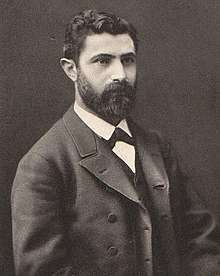Léo Errera
Abraham Léo Errera (4 September 1858 in Laeken – 6 August 1905 in Brussels) was a Belgian botanist, known for his research in the field of plant physiology. He worked at the Free University of Brussels in 1883 as an associate and in 1890 a full professor of botany. In addition, he was actively involved in Jewish affairs.

After receiving his liberal arts degree at the Université Libre de Bruxelles (1874), his focus turned to natural sciences, and in 1879 obtained his doctorate in botanical science.[1] He then travelled to Germany, where he furthered his education at the Universities of Strasbourg, Bonn, and Würzburg. In Strasbourg, he conducted research in the laboratories of Anton de Bary and Felix Hoppe-Seyler. At Würzburg, he studied plant physiology under Julius von Sachs.[2]
Following his return to Brussels, he founded the Laboratoire d'Anatomie et de Physiologie Végétales.[2] This laboratory eventually featured facilities for microscopy and chemistry, a greenhouse, a photography studio, a sterilization chamber, a thermostatic chamber and a darkroom for spectroscopy and polarimetry.[1]
He is credited with discovering the presence of glycogen in plants and fungi (amylopectin) through the use of sophisticated histochemical techniques. He later employed these techniques to detect alkaloids in plants.[2]
In 1887 he became a corresponding member of the Academie Royale des Sciences de Belgique, and in 1898 was elected a full member.[3] He died in 1905 at the age of 46 from a cerebral embolism.
Selected works
In 1893 he published "Les Juifs russes : extermination ou émancipation?" (with a prefatory letter by Theodor Mommsen), a book that was later translated and published in English as "The Russian Jews; extermination or emancipation?". Among his principal scientific works are the following:
- Errera L. A., Clautriau G., Maistriaux M. 1887. Premières recherches sur la localisation et la signification des alcaloides dans les plantes. H. Lamertin, Bruxelles. - on alkaloids.
- Planches de physiologie végétale, 1897 - On plant physiology.
- Une leçon elémentaire sur le Darwinisme, 1904 – Elementary lessons on Darwinism.
- Cours de physiologie moléculaire, 1907 – Course on molecular physiology.
- Recueil d'oeuvres de Léo Errera, 1908 – Collected works of Léo Errera.[3][4]
References
- Salomon Wininger: Große jüdische National-Biographie mit mehr als 8000 Lebensbeschreibungen namhafter jüdischer Männer und Frauen aller Zeiten und Länder. Ein Nachschlagewerk für das jüdische Volk und dessen Freunde. Bd. 2, Cernăuți 1926/1927.
- Encyclopaedia Judaica. Das Judentum in Geschichte und Gegenwart., Bd. 6, Eschkol, Berlin 1930.
- The universal Jewish encyclopedia in ten volumes. Bd. 4, New York 1948.
- Académie Royale des Sciences, des Lettres et des Beaux-Arts de Belgique: Annuaire. Bd. 68, Brüssel 1908.
Notes
- Université Libre de Bruxelles - Archives & Libraries biographical information
- Hartmann, T. "The lost origin of chemical ecology in the late 19th century". Proc Natl Acad Sci U S A. 105: 4541–6. doi:10.1073/pnas.0709231105. PMC 2290813. PMID 18218780.
- Biography @ Jewish Encyclopedia
- Works by or about Léo Errera in libraries (WorldCat catalog)